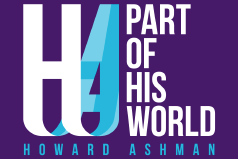New York 1973-1986
New York, 1973-1986
After receiving his degree, Howard moved to New York and was hired by Grosset & Dunlap Publishers.
He wrote to his sister, “I am so thrilled to be out of school, I can’t tell you. I hum ‘Well it’s you boy and you should know it. With each breath and every little movement you show it’ on my way to the office. Yes, I have become the male Mary Tyler Moore. And wait til I have the time and space to tell you about my female boss, Ms Louise Grant.
“I’m the assistant (that’s a fancy word for secretary/guy friday) for the editor of Tempo Books at Grosset and Dunlap,” he wrote. “My boss is a terrific, brilliant, verbal lady, and if I do well, something tells me that in ten years I’ll have a very very good career in publishing.”
Shortly after moving to New York, his one act plays, ‘Cause Maggie’s Afraid Of the Dark and Mud Season, were produced in a New York theater festival. Howard wrote, “It’s really very small scale and only one night, sans sets, costumes, everything, but at least it’s in New York and my Indiana friends are insanely jealous...exciting, non? I’m in heaven.”
Howard eventually left publishing to pursue a career in theater. He supported himself freelancing for Grosset and in one of life’s little ironies, the book he was most proud of editing was The Mickey Mouse Club Scrapbook.
In 1976, Howard wrote the book for Dreamstuff, a musical based on Shakespeare’s The Tempest. Produced at the WPA Theater on the Bowery (music Marsha Malamet, lyrics Dennis Green), it was the last production at WPA’s Bowery theater.
Circle Repertory’s Projects-In-Process produced Howard’s play, The Confirmation in 1976. It attracted interest and in the following year the show was produced in a pre-Broadway run at Princeton’s McCarter Theater and in Philadelphia. The production featured Hershel Bernardi in the lead role but did not move to Broadway or New York.
In 1977 Howard and partners took over leadership of a renewed WPA, moving it to a new space on Fifth Avenue and 19th Street. Howard was named co-Artistic Director (with Stuart White) of the theater, which quickly became known as a producer of distinctive off off Broadway fare.
In 1979, Howard wrote the libretto for a new production of Friml’s The Vagabond King which was produced at the Houston Grand Opera. He also directed Maury Yeston’s Nine, then a work in progress, for the O’Neill Theatre Center’s Composer/Librettists Conference.
Howard then acquired the rights to create a musical based on Kurt Vonnegut’s beloved novel, God Bless You Mr. Rosewater. At the suggestion of Mr. Yeston, Howard began working with composer Alan Menken (“It was fated for them to work together.” Mr. Yeston says, “ I was just the first one who said, ‘It’d be great for you guys to meet’”). In May 1979, God Bless You, Mr. Rosewater, based on the seminal Kurt Vonnegut novel with book, lyrics and direction by Howard and music by Alan Menken, opened to great reviews at the WPA Theater. Soon after, the show moved to the off Broadway Entermedia Theater for a short run. In 1981, Howard directed another production of the show at Arena Stage in Washington DC and in 2017 if was revived for a limited concert run by New York’s Encores Off-Center.
After Rosewater closed, Howard and Alan began work on a musical based on the life of Babe Ruth. After completing five songs for Babe, they tabled the project and began working on a musical based on a film Howard had loved in his teens - an odd cult film about a man-eating plant. Though family and friends advised against it, Howard pursued the project and In the spring of 1982, Little Shop of Horrors opened at the WPA Theater, with book, lyrics and direction by Howard and music by Alan Menken. An immediate underground success, it transferred during the summer to the Orpheum Theater in Manhattan’s East Village where it ran for five years, winning numerous awards and spawning productions all over the world.
During 1982 and 1983, Howard directed productions of LSOH in Los Angeles and London as well as the first national tour of the show in 1984.
In mid-1984, Howard and composer Jonathan Sheffer wrote two songs (Song For A Hunter College Graduate, Straw Boater Rag) for a Hal Prince-directed revue called Diamonds.
A film version of Little Shop of Horrors, with a screenplay by Howard and directed by Frank Oz was released in 1986. Mean Green Mother From Outer Space, written by Howard and Alan for the film version of LSOH was nominated for an Academy Award.
Howard’s next project was a new musical called Smile, which he directed and for which he wrote the book and lyrics. Marvin Hamlisch composed the music. Smile previewed in Howard’s hometown of Baltimore and transferred to the Lunt-Fontanne Theater on Broadway in November of 1986. Though the show enjoyed only a short run, it has since become popular with high school and college theater groups.

